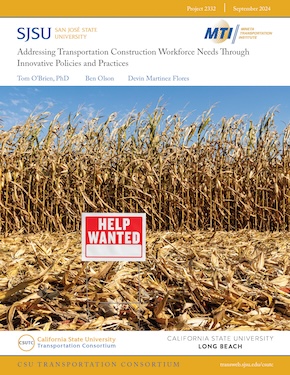- 408-924-7560
- mineta-institute@sjsu.edu
- Donate
Addressing Transportation Construction Workforce Needs Through Innovative Policies and Practices
A 2019 survey conducted by the Associated General Contractors of America, prior to the COVID-19 pandemic, found that construction firms across the country are struggling to fill open positions. Eighty percent of survey respondents indicated they have difficulty filling jobs in occupations that are essential to highway construction. This includes heavy equipment operators, cement masons, and iron workers, among others. This workforce shortage in California will become more problematic as public agencies and their contractors seek to implement projects funded by the Bipartisan Infrastructure Law (BIL), also known as the Infrastructure Investment and Jobs Act (IIJA). In California there are 1,536 bridges and over 14,220 miles of highway in poor condition. The IIJA will invest $4.9 billion in the state for highway-related infrastructure projects. The research team conducted a literature review of three economic sectors that have faced or are facing similar labor shortage issues. The three sectors are agriculture, technology, and healthcare. Informal interviews were held to help explore and validate findings from the literature. Agriculture labor recruitment strategies offer some potential solutions to similar issues in highway construction because of the cyclical nature of work in each—the agricultural cycle of agricultural crops and the project cycle of construction. Solutions include foreign worker programs, employee referral programs, and improving working conditions. In the technology sector, there has been some success in filling specialized-skill positions with workers who have trained in online, modular skill training provided by large companies such as Google or Microsoft. Leading highway construction firms could form a public partnership to develop and provide similar trainings for the highway construction skills in demand. The healthcare sector has been addressing a shortage of low-skill workers for a longer period of time and offers the broadest potential solutions. There has been some success in finding workers using policies for tuition reimbursement and incentivizing seasoned professionals to become instructors for programs that provide in-demand skills. The hiring checklist for highway construction composed in this report is high-level so that it has broad applicability. The steps were informed by research into the comparative sectors. They offer a hiring process that is proactive to anticipated projects and aims to increase retention and reduce turnover.
THOMAS O'BRIEN, PHD
Dr. Thomas O'Brien is the Associate Dean of the College of Professional and Continuing Education (CPaCE) at California State University, Long Beach (CSULB) and the Deputy Director of Long Beach Programs for the METRANS Transportation Consortium, a partnership of CSULB and the University of Southern California. He also serves as the Director of the FHWA Southwest Transportation Workforce Center (SWTWC). He previously served as the Executive Director of the Center for International Trade and Transportation (CITT) at CSULB). Dr. O’Brien is an instructor in CSULB’s Master of Science in Supply Chain Management (MSSCM). Dr. O’Brien is a member of the Executive Committee of the Council of University Transportation Centers (CUTC) where he served as president and is a member of the CUTC Workforce Development Taskforce and Chair of the oversight committee of the National Science Foundation’s National Center for Supply Chain Technology Education. He is a member of the Transportation Research Board’s Intermodal Freight Transport Committee and Urban Freight and Operations Committee. He also serves on the Boards of the Southern California Roundtable of the Council of Supply Chain Management Professionals, Los Angeles Transportation Club, Foreign Trade Association and National Transit Institute. Dr. O’Brien has a Master’s degree in Urban Planning and Development and a Ph.D. in Policy, Planning, and Development from the University of Southern California. He is both an Eno and Eisenhower Transportation Fellow.
BEN OLSON, MS
Ben Olson is the Center Operations Manager at the Center for International Trade and Transportation (CITT) at California State University, Long Beach (CSULB). At CITT, Ben manages the center’s GIS projects and research responsibilities. He leads to the development of GIS applications and their integration into training programs for working professionals and K–12 audiences. Ben received his Master’s in Geographic Information Science from CSULB and Bachelor’s in Statistics and Spanish from the University of Illinois, Urbana-Champaign (UIUC).
DEVIN MARTINEZ-FLORES
Devin Martinez-Flores is a Research Associate for the Center for International Trade and Transportation (CITT) at California State University, Long Beach (CSULB). As a research assistant Devin works with lead researchers to ensure projects are completed on time. Devin has worked on projects focused on reducing truck congestion through Intelligent Transportation Systems and workforce development toolkits. Devin received his Bachelor’s in Business Economics from CSULB.
-
Contact Us
San José State University One Washington Square, San Jose, CA 95192 Phone: 408-924-7560 Email: mineta-institute@sjsu.edu






